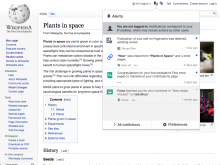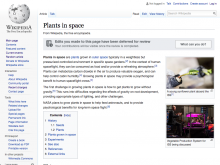Deferred changes is a technical way to mark for review and if necessary delay the visibility of suspicious edits by new or unregistered users until they have been manually reviewed by an editor. Registered users whose edits are "actively deferred," meaning they will not be published pending review, are informed of this via a notification. But anonymous users don't get notifications. Respect for anonymous users' efforts and participation requires that we inform them, at a minimum, of why their edit has not been published. This could be done, for example, via a dialog box or pop-up of some kind.
In this task, we will consider the best means of alerting anonymous users and the messaging that will be most helpful. Some questions that need to be answered:
- Evaluating edits for deferral presumably causes some delay. How long will that typically be?
- If the delay is too long for a pop-up message to be practical (because the user may have moved away from the page or closed the browser), what other means would work?
- E.g., Deferred Changes applies to new and anonymous users only. Would it be possible to delay Save of these users only so that the Deferred Changes analysis can be part of the Save function for them?
- Besides informing users that their edit was delayed, is there any other useful information we can direct them to. E.g., more about Deferred Changes process. Or how they can defend their edit? Or fix it?

